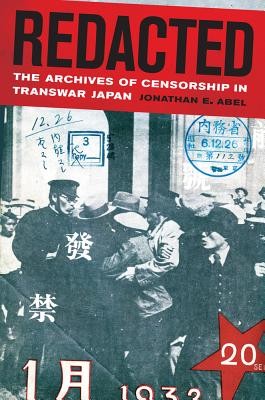
- We will send in 10–14 business days.
- Author: Jonathan Abel
- Publisher: University of California Press
- ISBN-10: 0520273346
- ISBN-13: 9780520273344
- Format: 15.8 x 23.4 x 2.5 cm, hardcover
- Language: English
- SAVE -10% with code: EXTRA
Reviews
Description
At the height of state censorship in Japan, more indexes of banned books circulated, more essays on censorship were published, more works of illicit erotic and proletarian fiction were produced, and more passages were Xed out than at any other moment before or since. As censors construct and maintain their own archives, their acts of suppression yield another archive, filled with documents on, against, and in favor of censorship. The extant archive of the Japanese imperial censor (1923-1945) and the archive of the Occupation censor (1945-1952) stand as tangible reminders of this contradictory function of censors. As censors removed specific genres, topics, and words from circulation, some Japanese writers converted their offensive rants to innocuous fluff after successive encounters with the authorities. But, another coterie of editors, bibliographers, and writers responded to censorship by pushing back, using their encounters with suppression as incitement to rail against the authorities and to appeal to the prurient interests of their readers. This study examines these contradictory relationships between preservation, production, and redaction to shed light on the dark valley attributed to wartime culture and to cast a shadow on the supposedly bright, open space of free postwar discourse. (Winner of the 2010-2011 First Book Award of the Weatherhead East Asian Institute, Columbia University" ).
EXTRA 10 % discount with code: EXTRA
The promotion ends in 17d.06:28:04
The discount code is valid when purchasing from 10 €. Discounts do not stack.
- Author: Jonathan Abel
- Publisher: University of California Press
- ISBN-10: 0520273346
- ISBN-13: 9780520273344
- Format: 15.8 x 23.4 x 2.5 cm, hardcover
- Language: English English
At the height of state censorship in Japan, more indexes of banned books circulated, more essays on censorship were published, more works of illicit erotic and proletarian fiction were produced, and more passages were Xed out than at any other moment before or since. As censors construct and maintain their own archives, their acts of suppression yield another archive, filled with documents on, against, and in favor of censorship. The extant archive of the Japanese imperial censor (1923-1945) and the archive of the Occupation censor (1945-1952) stand as tangible reminders of this contradictory function of censors. As censors removed specific genres, topics, and words from circulation, some Japanese writers converted their offensive rants to innocuous fluff after successive encounters with the authorities. But, another coterie of editors, bibliographers, and writers responded to censorship by pushing back, using their encounters with suppression as incitement to rail against the authorities and to appeal to the prurient interests of their readers. This study examines these contradictory relationships between preservation, production, and redaction to shed light on the dark valley attributed to wartime culture and to cast a shadow on the supposedly bright, open space of free postwar discourse. (Winner of the 2010-2011 First Book Award of the Weatherhead East Asian Institute, Columbia University" ).


Reviews